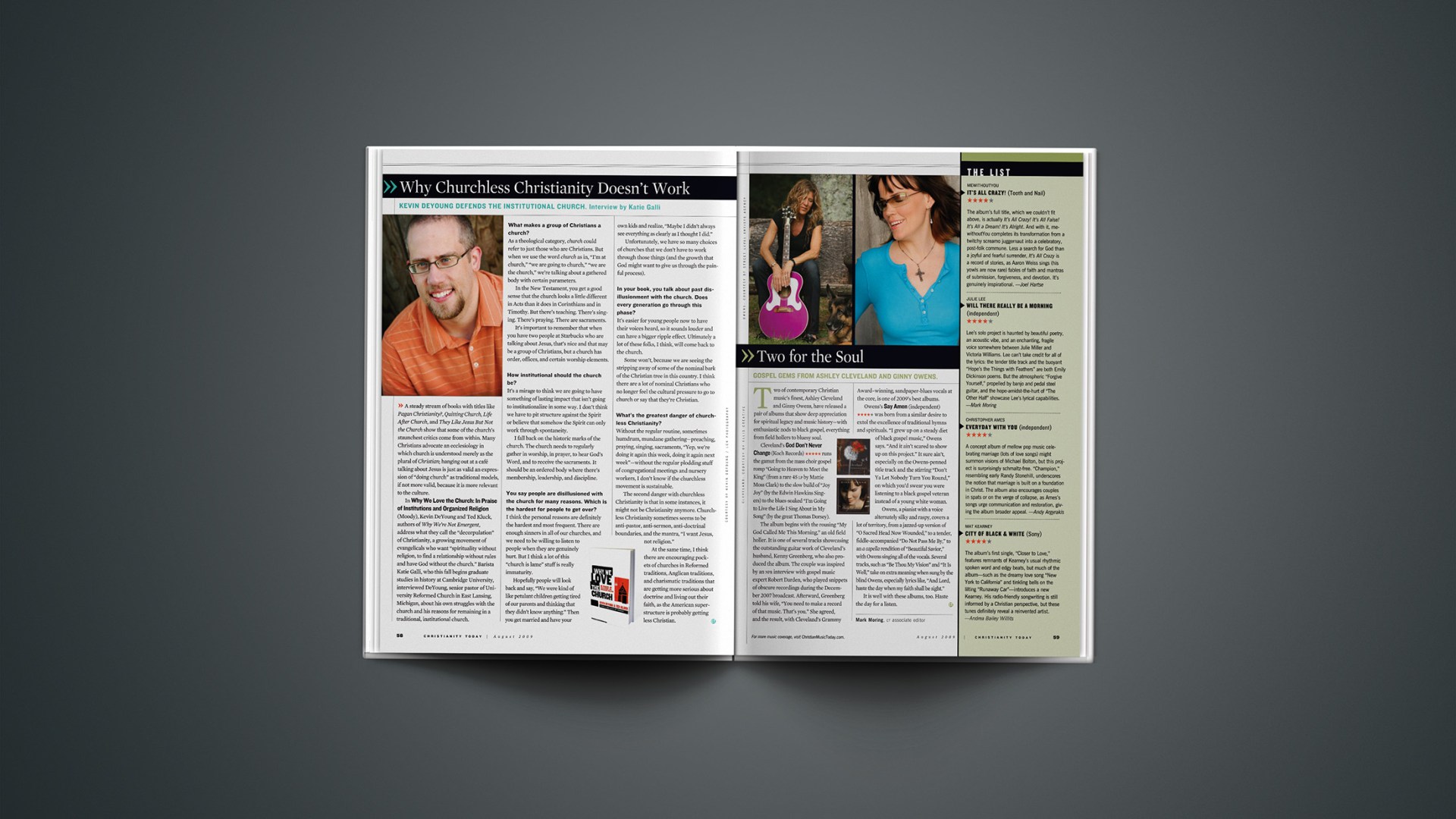A steady stream of books with titles like Pagan Christianity?, Quitting Church, Life After Church, and They Like Jesus But Not the Church show that some of the church’s staunchest critics come from within. Many Christians advocate an ecclesiology in which church is understood merely as the plural of Christian; hanging out at a café talking about Jesus is just as valid an expression of “doing church” as traditional models, if not more valid, because it is more relevant to the culture.
In Why We Love the Church: In Praise of Institutions and Organized Religion (Moody), Kevin DeYoung and Ted Kluck, authors of Why We’re Not Emergent, address what they call the “decorpulation” of Christianity, a growing movement of evangelicals who want “spirituality without religion, to find a relationship without rules and have God without the church.” Barista Katie Galli, who this fall begins graduate studies in history at Cambridge University, interviewed DeYoung, senior pastor of University Reformed Church in East Lansing, Michigan, about his own struggles with the church and his reasons for remaining in a traditional, institutional church.
What makes a group of Christians a church?
As a theological category, church could refer to just those who are Christians. But when we use the word church as in, “I’m at church,” “we are going to church,” “we are the church,” we’re talking about a gathered body with certain parameters.
In the New Testament, you get a good sense that the church looks a little different in Acts than it does in Corinthians and in Timothy. But there’s teaching. There’s singing. There’s praying. There are sacraments.
It’s important to remember that when you have two people at Starbucks who are talking about Jesus, that’s nice and that may be a group of Christians, but a church has order, offices, and certain worship elements.
How institutional should the church be?
It’s a mirage to think we are going to have something of lasting impact that isn’t going to institutionalize in some way. I don’t think we have to pit structure against the Spirit or believe that somehow the Spirit can only work through spontaneity.
I fall back on the historic marks of the church. The church needs to regularly gather in worship, in prayer, to hear God’s Word, and to receive the sacraments. It should be an ordered body where there’s membership, leadership, and discipline.
You say people are disillusioned with the church for many reasons. Which is the hardest for people to get over?
I think the personal reasons are definitely the hardest and most frequent. There are enough sinners in all of our churches, and we need to be willing to listen to people when they are genuinely hurt. But I think a lot of this “church is lame” stuff is really immaturity.
Hopefully people will look back and say, “We were kind of like petulant children getting tired of our parents and thinking that they didn’t know anything.” Then you get married and have your own kids and realize, “Maybe I didn’t always see everything as clearly as I thought I did.”
Unfortunately, we have so many choices of churches that we don’t have to work through those things (and the growth that God might want to give us through the painful process).
In your book, you talk about past disillusionment with the church. Does every generation go through this phase?
It’s easier for young people now to have their voices heard, so it sounds louder and can have a bigger ripple effect. Ultimately a lot of these folks, I think, will come back to the church.
Some won’t, because we are seeing the stripping away of some of the nominal bark of the Christian tree in this country. I think there are a lot of nominal Christians who no longer feel the cultural pressure to go to church or say that they’re Christian.
What’s the greatest danger of churchless Christianity?
Without the regular routine, sometimes humdrum, mundane gathering—preaching, praying, singing, sacraments, “Yep, we’re doing it again this week, doing it again next week”—without the regular plodding stuff of congregational meetings and nursery workers, I don’t know if the churchless movement is sustainable.
The second danger with churchless Christianity is that in some instances, it might not be Christianity anymore. Churchless Christianity sometimes seems to be anti-pastor, anti-sermon, anti-doctrinal boundaries, and the mantra, “I want Jesus, not religion.”
At the same time, I think there are encouraging pockets of churches in Reformed traditions, Anglican traditions, and charismatic traditions that are getting more serious about doctrine and living out their faith, as the American superstructure is probably getting less Christian.
Copyright © 2009 Christianity Today. Click for reprint information.
Related Elsewhere:
Why We Love the Church is available at ChristianBook.com and other book retailers.
DeYoung and Kluck also won first place in the church/pastoral leadership division of Christianity Today‘s 2009 book awards for Why We’re Not Emergent (By Two Guys Who Should Be).
Previous articles about church life include:
The Church—Why Bother? | There is no healthy relationship with Jesus without a relationship to the church. (January 6, 2005)
Why I Return To The Pews | The church has often left me bemused, bored, or mystified, but I can no more abandon it than I can myself. (December 1, 2004)
Editor’s Bookshelf: Survival Through Community | An interview with Charles Colson, author of Being the Body. (May 19, 2003)











